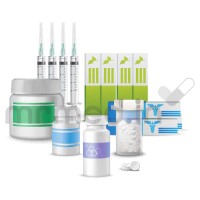Gushout syrup 200ml contains active components called Magnesium Citrate, Potassium Citrate and Vitamin B6. It is used to treat and prevent kidney stones. Thus, medication is also used for renal tubular acidosis (a condition in which the kidneys do not remove acids from the blood). It helps treat hypokalemia (low potassium levels) and hypomagnesemia (low magnesium levels) caused by drug treatment in kidney stones. It may help to improve the quality of life for people with kidney stones. It can help prevent gout flares by increasing the citrate in the urine.
If you are allergic to any of the ingredients in Gushout syrup 200ml, you should not take this medication. It can worsen kidney function in people with severe kidney disease. Therefore, it should not be used by these people. It should not be used in people with high potassium levels. It should be avoided in patients with dehydration, heart problems, heat cramps, and untreated Addison's disease.
Gushout syrup 200ml is generally safe for older adults. However, talking to your doctor before taking this medication is important, as older adults are more likely to have kidney problems and other health conditions that may interact with this medication. It is not recommended for children under the age of 12.
- Kidney stones
- Renal tubular acidosis
- Hypokalemia
- Hypomagnesemia
- Gout flares
- Metabolic acidosis
Therapeutic Effects of Gushout Syrup 200ml
Pregnancy
Gushout syrup 200ml is generally safe to take during pregnancy. However, it is important to talk to your doctor before taking this medication, as weighing the risks and benefits of any medication taken during pregnancy is important.
Breast Feeding
Gushout syrup 200ml is generally safe to take while breastfeeding. However, it is important to talk to your doctor before taking this medication, as weighing the risks and benefits of any medication taken while breastfeeding is important.
Lungs
It is important to talk to your doctor before taking Gushout syrup 200ml if you have a severe lung condition.
Liver
It is important to talk to your doctor before taking Gushout syrup 200ml if you have a severe liver condition, such as cirrhosis or hepatitis.
Alcohol
Alcohol can dehydrate you and worsen kidney function. Therefore, it is not safe to take alcohol when taking Gushout syrup 200ml.
Driving
Gushout syrup 200ml is not known to impair driving ability. However, it is important to talk to your doctor before taking it if you are concerned about how it may affect your driving ability.
Serious:
- High potassium levels (hyperkalemia)
- Muscle weakness
- Confusion
- Slow heartbeat
- Kidney problems
Common:
- Diarrhea
- Stomach upset
- Gas
- Nausea
- Vomiting
Gushout syrup 200ml starts working immediately after you take it. However, it may take several weeks or months to see the full effects of the medication.
The length of time you need to take Gushout syrup 200ml will vary depending on the condition you are being treated for. Your doctor will tell you how long you need to take the medication.
If you miss a dose of Gushout syrup 200ml, take it as soon as you remember. However, if it is almost time for your next dose, skip the missed dose and continue with your regular dosing schedule. Do not double up on your next dose.
You can usually take Gushout syrup 200ml if you have diabetes. However, monitoring your blood sugar levels closely is important, as it can affect blood sugar levels.
You can usually take Gushout syrup 200ml if you have high blood pressure. However, monitoring your blood pressure closely is important, as it can affect blood pressure.
Talk to your doctor if you experience any side effects from Gushout syrup 200ml. Some side effects, such as diarrhea and vomiting, may be mild and go away independently. However, other side effects may be more serious, such as muscle weakness, confusion, and slow heartbeat.
Molecule name: Magnesium Citrate, Potassium Citrate, and Vitamin B6 | Therapeutic class: Urolithiasis medication |
Pharmacological class: Alkalizing agents.
| Indications: 1. Kidney stones 2. Renal tubular acidosis 3. Hypokalemia 4. Hypomagnesemia 5. Gout flares 6. Metabolic acidosis |



